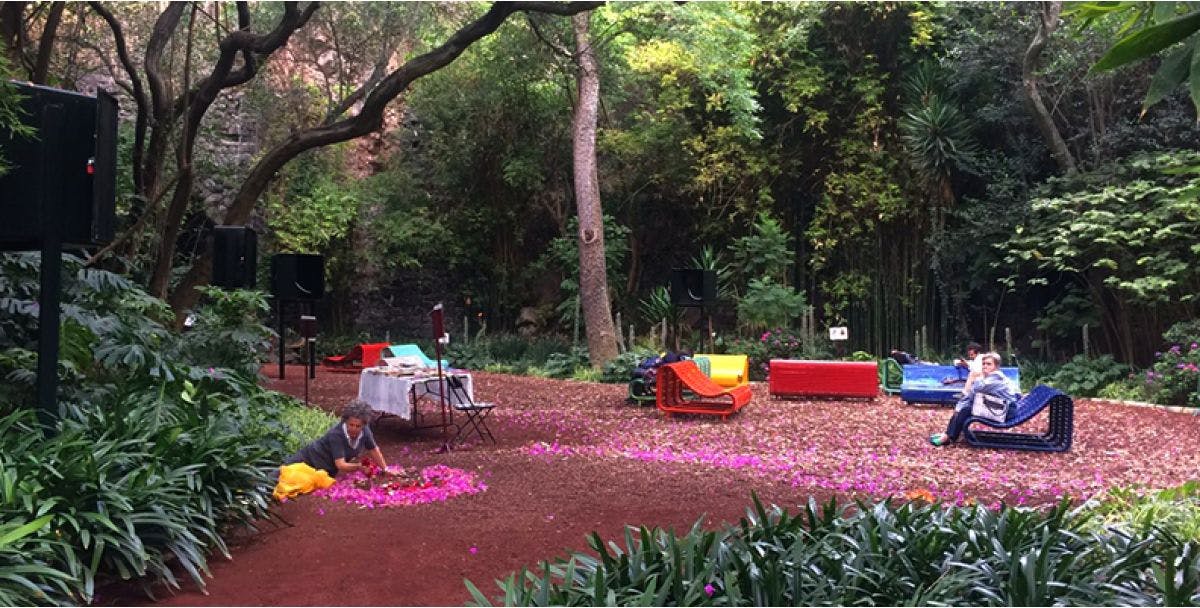In the heart of Mexico City is Bosque de Chapultepec, a park that is roughly double the size of New York’s Central Park and has a history dating back to the Aztecs. There is a space nestled away in a corner of the park dedicated to peace and quiet that is called the Audiorama. Talking and other noises (like your cellphone) are not permitted, save for the rustling of trees and some gently piped-in music. The space is a refuge from noise and distraction – a rare commodity in the age of smartphones. Entering the space felt sacred, as if one were entering a temple. I have been to parks around the world, but I have never found a space so dedicated to silence and free from distraction. In the heart of one of the largest and busiest cities in North America (sorry New York), I felt completely removed from the rest of the city.
Such areas are rare to find in cities and even harder to find in our daily lives. Even if we find an escape to a park or other quiet space, there is the constant hum of motors, horns, and the beeps of smartphones demanding our instant attention. Even in nature, it can be hard to escape the noises of human activity. I recall a time at a lake in Canada when the sound of a nearby lawnmower echoed across the water, disrupting the tranquility of late evening. Advertising has crept into public spaces, creating visual noise with billboards looming overhead or ads popping up on stand-up displays on walking paths. Getting away from noise of all types has become a luxury for those who can afford to leave the city boundaries to private or government-owned parks that are far removed from the distractions of the city.

Being constantly exposed to noise has an impact on our health.
Constant exposure to noise can trigger anxiety and stress and can impact our ability to sleep. Studies have also suggested that exposure to noise pollution can have impacts on our physical health, including hearing loss and cardiovascular disease. We have become so accustomed to the daily noise that fills our lives that we often do not realize it until we find ourselves in a genuinely quiet place like Audiorama.
Nature can offer a reprieve from the manufactured noise of cities. Organizations such as PaRx have advocated for sojourns into nature to be medically prescribed by doctors. If nature is to be a prescription for better health, then we have an obligation to ensure that such spaces are accessible to everyone, and not just those who can afford the luxury of escaping the city. This means treating green spaces as essential to cities and not just adding recreation spaces to development proposals. So, too, must we consider the impacts that noise has on our green spaces. A city park surrounded by highways and bombarded by noise pollution will not provide a reprieve from the stresses created by the city.
Noise is ubiquitous in our contemporary lives. Spaces like Audiorama in Mexico City provide a reprieve from the bombardment of city noise and the busyness of our daily lives. We must work to ensure that such spaces are not reserved for the privileged who can afford to escape to the countryside or parks beyond the city limits but are available and accessible by everyone. Incorporating quiet spaces into city planning processes can change our human experience in the city. Imagine walking down the street and not being bombarded by the constant noise of traffic or the visual distraction of sparkling billboards. Finding quiet has become a luxury, but it does not need to be one available only to the wealthy. Audiorama showcases how easily a quiet space can be incorporated into the public realm.
Millar, H. (2020). What are the health effects of noise pollution? Retrieved 08 04 2022 from https://www.medicalnewstoday.com/articles/noise-pollution-health-effects




